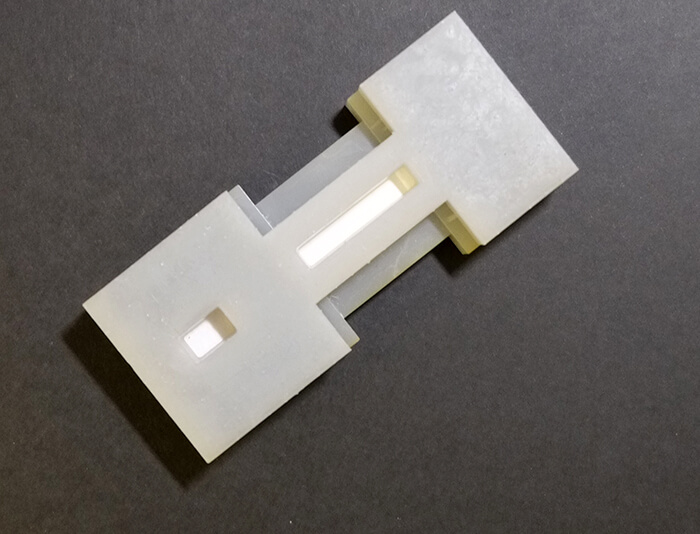March 28, 2017
Research could lead to test strips for early cervical cancer detection
 A prototype of a Purdue research team’s lateral flow test strip that could eventually be used for the early detection of cervical cancer. (Purdue Research Foundation photo/Curt Slyder)
Download image
A prototype of a Purdue research team’s lateral flow test strip that could eventually be used for the early detection of cervical cancer. (Purdue Research Foundation photo/Curt Slyder)
Download image
WEST LAFAYETTE, Ind. – Purdue researchers are developing technology that could lead to the early detection of cervical cancer with low-cost, easy-to-use, lateral flow test strips similar to home pregnancy tests.
“This field really needs an additional way to test for cervical cancer. A test that can report cervical cancer right away is very instrumental in a lot of low- and middle-income countries where women often get HPV tests and then never come back,” said Joseph Irudayaraj, professor of biological engineering in Purdue’s School of Agricultural and Biological Engineering. “In higher-income countries, it’s important that anything beyond HPV tests have the ability to complement those tests.”
The fourth most common type of cancer for women, cervical cancer is potentially curable if detected early. However, it still claims many lives among women living in low- and middle-income countries. According to the World Cancer Research Fund International, about 84 percent of cervical cancer cases occur in less developed countries.
Current testing relies on detection of the human papillomavirus or HPV, an infection that could inform on the presence of a cervical disease. The HPV test has poor specificity. Hence, there is a need for alternative or complementary evaluation.
The Purdue researchers’ technology is taking testing a step further, attempting to detect cervical cancer in its early stages with a specialized test strip resembling a home pregnancy test, with unparalleled sensitivity. The technology works by changing the strip’s color within 15-30 minutes to indicate the presence of specific proteins associated with cervical cancer.
Researchers have proven the concept and are working on an early prototype of the technology.
“We’re working to greatly improve the detection limit of our testing,” said Wen Ren, a Purdue postdoctoral researcher working with Irudayaraj. “That will make it much easier to detect cervical cancer based on a very low amount of markers in smaller samples.”
The biomarkers are in collaboration with Dr. Sulma Mohammed, associate professor of cancer biology in Purdue’s College of Veterinary Medicine.
In addition to cervical cancer, researchers believe this technology could one day be instrumental in early detection of other diseases, as well, including infectious pathogens.
A USDA grant is helping fund the research. Researchers are seeking additional funding in addition to corporate collaborators to help advance the research.
This technology has been patented through the Purdue Research Foundation Office of Technology Commercialization and is available for licensing. For more information about developing and commercializing this or other Purdue innovations, contact the Purdue Office of Technology Communication at 765-588-3470, otc@prf.org
About Purdue Office of Technology Commercialization
The Purdue Office of Technology Commercialization operates one of the most comprehensive technology transfer programs among leading research universities in the U.S. Services provided by this office support the economic development initiatives of Purdue University and benefit the university's academic activities. The office is managed by the Purdue Research Foundation, which received the 2016 Innovation and Economic Prosperity Universities Award for Innovation from the Association of Public and Land-grant Universities. For more information about funding and investment opportunities in startups based on a Purdue innovation, contact the Purdue Foundry at foundry@prf.org. For more information on licensing a Purdue innovation, contact the Office of Technology Commercialization at innovation@prf.org.
Writer: Curt Slyder, 765-588-3342, caslyder@prf.org
Sources: Joseph Irudayaraj, 765-494-0388, josephi@purdue.edu
Wen Ren, renwen.chem@gmail.com

